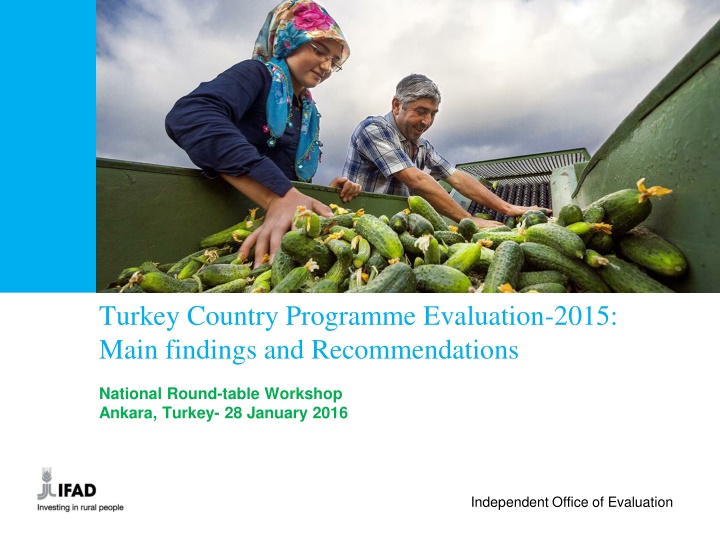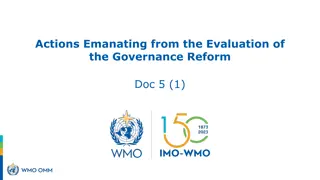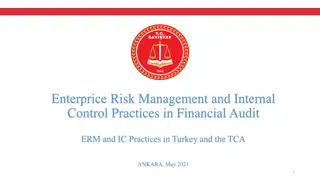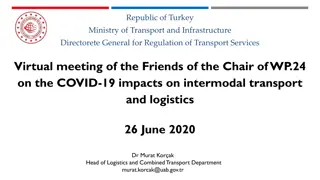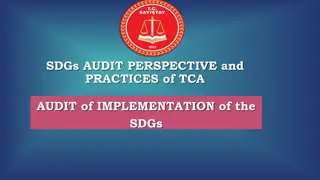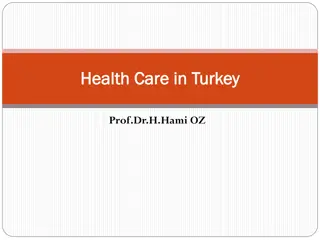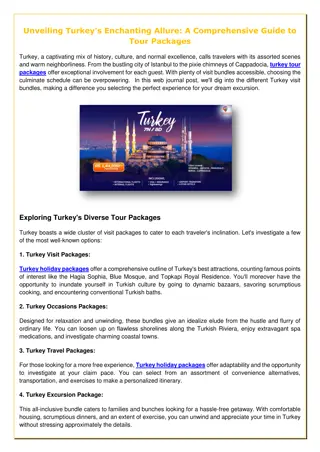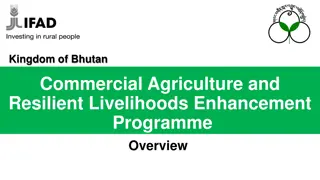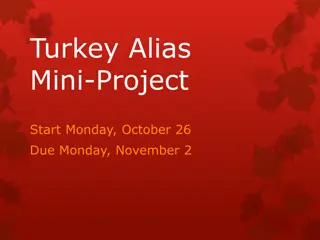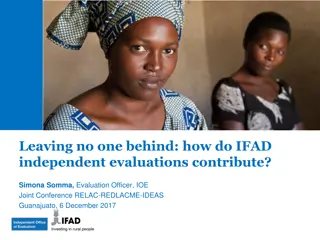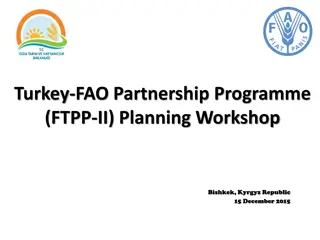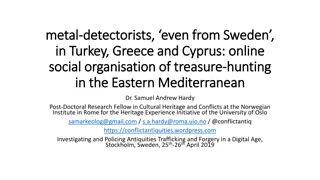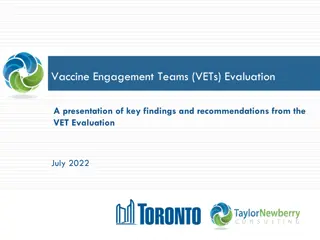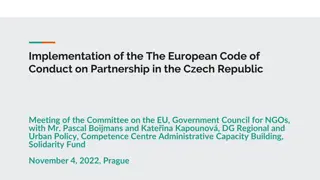IFAD-Turkey Partnership Evaluation: Findings and Recommendations
This evaluation report highlights the key findings and recommendations from the IFAD-supported operations in Turkey. It assesses the partnership's performance, impact, and strategic objectives alignment with government priorities. Recommendations focus on enhancing development effectiveness, expanding partnership pillars, and improving visibility for better dialogue and collaboration.
Download Presentation

Please find below an Image/Link to download the presentation.
The content on the website is provided AS IS for your information and personal use only. It may not be sold, licensed, or shared on other websites without obtaining consent from the author.If you encounter any issues during the download, it is possible that the publisher has removed the file from their server.
You are allowed to download the files provided on this website for personal or commercial use, subject to the condition that they are used lawfully. All files are the property of their respective owners.
The content on the website is provided AS IS for your information and personal use only. It may not be sold, licensed, or shared on other websites without obtaining consent from the author.
E N D
Presentation Transcript
Turkey Country Programme Evaluation-2015: Main findings and Recommendations National Round-table Workshop Ankara, Turkey- 28 January 2016 Independent Office of Evaluation
IFAD-Turkey Cooperation. Total number of approved loans: 10 Total value of portfolio: USD 661.1million IFAD loans: USD 189 million Counterpart funding (Contribution from Government and beneficiaries): US$ 323.3 million Co-financing: US$ 148.8 million On-going projects:2 CPE covers IFAD Turkey partnership from 2003-2015, inter-alia,4 projects, 2000 & 2006 COSOP, and country programme management Independent Office of Evaluation - 2 -
Evaluation 2015 Objectives/Methodology Objectives Assess the performance an impact of IFAD-supported operations in Turkey. Generate findings and recommendations to enhance the country programme s overall development effectiveness. Provide relevant information and insight to inform the formulation of the future Country Programme Opportunities Strategy (COSOP) by IFAD and the Government. Methodology CPE assesses: (i) project portfolio performance; (ii) non-lending activities including grants and SSTC; (iii) performance of the 2000 and 2006 COSOP. A variety of data collection methods used and triangulation. Independent Office of Evaluation - 3 -
Process Preparatory phase (April-May 2015): approach paper and preparatory mission. Desk review (May-June): preparation of desk review notes, identification of hypotheses and issues to explored in the course of the evaluation. CPE main mission (July): a multidisciplinary team of experts visited all current projects and held a wrap up mission in Ankara. Analysis, report writing and peer review (September-November) CPE national roundtable workshop (January 2016) Independent Office of Evaluation - 4 -
Main findings General Valued and strategic partnership can be strengthened and adjusted. Partnership needs to better reflect Turkey s MIC status. Key pillars of future partnership: SSTC, Innovation, Knowledge Sharing. Relatively small IFAD financing, but highly valued at local level and important for addressing poverty pockets. Need to improve IFAD visibility in the country to facilitate better dialogue and strengthen partnerships. Independent Office of Evaluation - 5 -
Main findings (cont.) Country Strategy Good alignment of country strategic objectives with IFAD and government policies and priorities. Consistent and understandable geographic focus on Turkey's lagging regions. Focus on southern and eastern Anatolia appropriate. Targeting approach has become diffuse rather than focused on the rural poor. Local, particularly household level targeting could be further refined. New and additional focus on natural resources management- from previous strategic thrust in agriculture commercialization with strong area-based targeting approach. Independent Office of Evaluation - 6 -
Main findings (cont.) The project Portfolio Project objectives consistent with the government priorities; relevant focus on commercial agriculture, but challenges with targeting poor farmers, women and youth. Effectiveness is mixed. Improvement in the incomes, agricultural productivity and commercialization; modest gains in rural employment and self-sustaining institutions of the rural poor. Investments well-managed and cost-effective (infrastructure highly efficient) but efficiency offset by limited replication of new agricultural technology demonstration effect, and implementation delays. Independent Office of Evaluation - 7 -
Main findings (cont.) The project Portfolio Sustainability of benefits requires attention limited by weak operation and maintenance and insufficient collaboration with the rural financial sector. The M&E function has been consistently a low performing area for the programme. Promotion of gender equality is moderately unsatisfactory. Participation and benefits achieved for women in terms of empowerment has been limited. Some valuable innovations introduced, but they were mostly incremental, and evidence of scaling up was limited. Independent Office of Evaluation - 8 -
Main findings (cont.) Non-lending activities Partnerships with implementing agencies at central/provincial levels is very good. Limited with policy-level government partners, cooperating partners, NGOs and the private sector. Policy engagement has been overall limited. Conducted mainly through the COSOP and the projects, within a narrow circle (two main implementing agencies). Several valuable knowledge management activities carried out, but overall no systematic effort to collect, document and disseminate lessons and best practices. IFAD's visibility in Turkey remains limited. IFAD support to SSTC in Turkey is incipient -yet to provide an adequate response to Turkey s interest and capacity in this area. Independent Office of Evaluation - 9 -
Five main conclusions Over the past 13 years the Fund has made a positive contribution to agriculture and rural development in Turkey. The overall results of the partnership have been moderately satisfactory. The long-standing IFAD-Turkey partnership remains strategically important for both IFAD and the Government of Turkey. Access to project benefits remains a challenge for poorer farmers, women and youth of particular concern in a growing income disparity context. Independent Office of Evaluation - 10 -
Five main conclusions (cont.) There is demand for IFAD to be a more active player in sharing international best practices in Turkey -additional value to the partnership. Positive signs in the evolution of the programme: IFAD country office in Turkey; openness to new partnerships; new investments; recent progress in SSTC. Independent Office of Evaluation - 11 -
Five strategic recommendations 1. Prepare a new COSOP with a proper analysis of IFAD s strengths and limitations in Turkey and the opportunities and threats it faces in building more effective partnerships with the Government and others. Improve targeting, particularly for poorer farmers and specific target groups, including women and youth. Sharply define M&E systems to track participation and benefits. 2. Strengthen non-lending activities (partnerships, knowledge management, policy dialogue) and ensure synergies with the portfolio. 3. Independent Office of Evaluation - 12 -
Five strategic recommendations Emphasize innovation and scaling up as key strategic priorities. 4. Strengthen the strategic focus on women and youth. Focus on gender equality and women s empowerment and direct targeting of youth. 5. Independent Office of Evaluation - 13 -
Next Steps in the CPE Agreement at Completion Point. February 2016 Final CPE report published. March 2016 Discussion in IFAD Evaluation Committee. 29-30 March 2016 Discussion in IFAD Executive Board. 13-14 April 2016 Independent Office of Evaluation - 14 -
Thank you for your attention Independent Office of Evaluation - 15 -
Working Groups Working Group 1 The role and priorities of IFAD (e.g. in terms of thematic and geographic coverage) in Turkey. Facilitator: Rapporteur Mr. Do an AKAR, Sivas Erzincan Development Project Regional Administrator Independent Office of Evaluation - 16 -
Working Groups Working Group 2 The opportunities and challenges for IFAD to further enhance its non-lending activities (knowledge management, policy dialogue, partnership-building, south-south cooperation) in support of enhancing its performance and rural transformation in the country. Facilitator: Rapporteur Mr. Murat EV K Ardahan-Kars-Artvin Development Project Regional Administrator Independent Office of Evaluation - 17 -
Working Group Working Group 3 Targeting approaches and strategies to ensure inclusiveness and equal opportunities for the rural poor throughout the IFAD-supported programme. Facilitator: Mr. Mehmet Ayd n BELGE, Responsible for Instrument for Pre-Accesion Assistance Rural Development Programme of EU Rapporteur: Independent Office of Evaluation - 18 -
